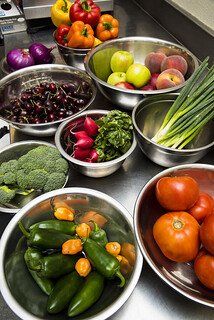The Transformative Impact of Technology in the Food and Beverage Industry

For decades, a direct correlation between food and technology has never been evident. With the rapid food innovation in the 21st century, the tables have completely turned. The food and beverage industry has risen as a vibrant, intriguing, and highly impactful sector. It is even more interesting to note that these changes are market-driven, helmed by evolving consumer demands and fluctuating market trends. With the increasing global population, the demand for food and beverage products is simultaneously rising.
This, in turn, has necessitated faster turnovers in manufacturing and processing. Furthermore, escalating competition and inflation are necessitating cost-rationalization and operational efficiency. These factors have collectively led to the need for cutting-edge technology and its transformative impact in the food and beverage industry.
Linking Food Innovation with Tech Advancements
AI-driven technology has been single-handedly responsible for driving food innovation and beverage advancements in the 21st century. Coupled with data analysis and statistical factoring, these have ushered in a new era of operational efficiency, supply chain transparency, and offerings tailored to meet the highly evolved consumer preferences. Here are four areas where technology has had a transformative impact in the food and beverage industry:-
-
Widespread Robotics Implementation
When we visualize robotics in F&B, the first thought that comes to mind is the food service robot at a restaurant. But the usage of robotics goes far beyond this flourishing global industry. Robotic arms are used for crucial tasks at the processing level. The most common applications include sorting potatoes (for fries, crisps, hash browns, etc.), processing complex meat cuts, assessing the quality of fruits and veggies for online delivery, and so on.
2. Drones for Boosting Agricultural Productivity
Climate change is a grave issue, and so are issues like soil degradation (due to various factors like excessive fertilizers), pest attacks, and more. To counter the multiple uncertainties and boost agricultural output, food tech companies have developed agricultural drones. These are equipped with advanced sensors to monitor all the critical factors, provide real-time data, predict and warn about upcoming threats in advance. This helps farmers adopt the proper practices, prevents crop damage, and boosts farm productivity.
3. Replacing Plastics with Recyclable Materials
When we speak of food and drink trends, one of the biggest consumer inclinations in recent years is to opt for brands that use sustainable packaging material. With eco-consciousness being a top consumer priority, brands are eager to invest in suitable technology to replace plastic with recyclable materials. Tech firms have come up with edible packaging produced from rice bran, palm leaves, microfiber, and so on. Owing to the Covid-19 pandemic, engineers have also been working on advanced, anti-bacterial, and antiviral micro-packaging.
4. Smart Sensors for Supply Chain Management
Food and beverage supply chains are highly critical due to multiple factors such as the temperature sensitivity of the raw materials and the processed foods, the use of damage-proof containers, monitoring of pilferage, and the varying shelf-lives of different products. Installing smart sensors at various checkpoints is helping F&B businesses to efficiently handle all these aspects without having to conduct manual checks. AI-driven sensors even allow remote access, enabling real-time data access of all the synced checkpoints directly on your smartphone or laptop.
To Conclude
Food and drink trends in the coming years will be largely driven by rapidly shifting consumer needs and perceptions. As an aftermath of the Covid-19 pandemic, the demand for healthier, cheaper, and eco-friendly consumables is at an all-time high. Additionally, there is a high emphasis on convenience cooking, personalized nutrition, and hygiene. In response, tech innovation has brought about accurate demand forecasting, reduced wastage, safer processing/storage/transport conditions, and, most importantly, enhanced consumer experiences.
Read Also: What Are The Nutrients In Lychee Juices?
Importance of market research in the food industry?
What is the main goal of food and beverage services?
Top 6 companies that provide food and beverage advanced analytics Data
How brands are using big data analytics?




